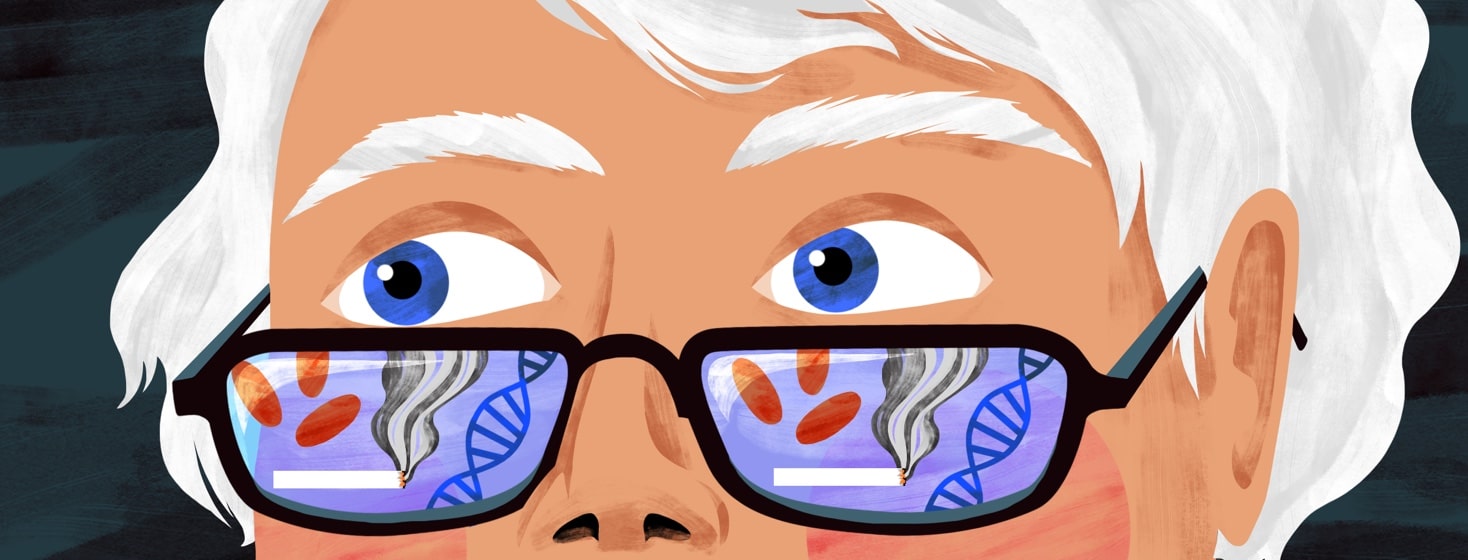Why Me? More to the Point, Why Not Me?
We know that genetics plays a big role in developing macular degeneration. I don’t think my grandparents had AMD, although one grandfather may have if he had lived longer. But my mother developed it around her mid-sixties, while one of her brothers was diagnosed at a much older age. My mother eventually lost her central vision to geographic atrophy, while my uncle’s didn’t progress as quickly. But mom was a smoker most of her life, my uncle not as much.
Smoking and advanced AMD
We know the main risk factors are age and family history. But smoking plays a major part as well in our susceptibility to it, including the more damaging advanced AMD. According to the American Academy of Ophthalmology, the top five risk factors are: being over the age of 60, having a family history of AMD, cigarette smoking, obesity, and hypertension.1
Different outcomes among my sisters
I have two older sisters, both with the same light-coloured eyes as I have. We have similar genetic makeup, the same upbringing in the same house with second-hand smoke. We even look alike! But we are all having such different outcomes from our hereditary makeup.
I had been a smoker for 30 years
The oldest, now eighty, with no symptoms, has just been diagnosed with the very earliest stage of AMD; and not a smoker. The next has no sign of it; again, not a smoker. Then there’s me. I had been a smoker for 30 years but had finally been able to quit about five years before my diagnosis.
Zinc sensitivity and increased progression
I began taking the AREDS supplements as directed when I was diagnosed around age 58. Fast forward 12 years to a diagnosis of choroidal neovascularization, the advanced “wet” form in my left eye. This was about the time the genetic testing for zinc sensitivity had become available. I had the testing done to see if the high amounts of zinc in those supplements all those years may have played a role. I discovered I’m in the 15% with zinc sensitivity. Studies have shown that for subjects with zinc sensitivity, treatment with zinc was associated with increased progression to advanced AMD.2 My sisters have not needed, nor have had genetic testing done.
We now know the AREDS and AREDS2 supplements won’t help prevent the onset of AMD, nor help with early AMD.3
A combination of inherited and lifestyle risks
My genetic risk showed high at 94%, which, as I understand it, means that 94% of the Caucasian population has a lower risk than I have of developing this sight stealing disease. It doesn’t necessarily predetermine my AMD progression. My inherited risk remains the same for my lifetime, but I know my lifestyle has had a major impact as well. At least all three of us have always been careful about wearing sunglasses.
Why me?
What’s the bottom line? There’s no way to determine if it was the smoking, the zinc, or just the luck of the draw that hastened the progression of my macular degeneration. Or the non-smoking, less zinc lifestyle that saved my sisters. I think it was probably a combination of all of the above. Have you compared your siblings' lifestyles for this? Or found something that helps explain the “why me” that most of us sometimes wonder?
Editor's Note: As of August 2023, 2 drugs known as complement inhibitors — Syfovre® and Izervay™ — have been approved by the US Food and Drug Administration (FDA) to treat geographic atrophy (GA).

Join the conversation